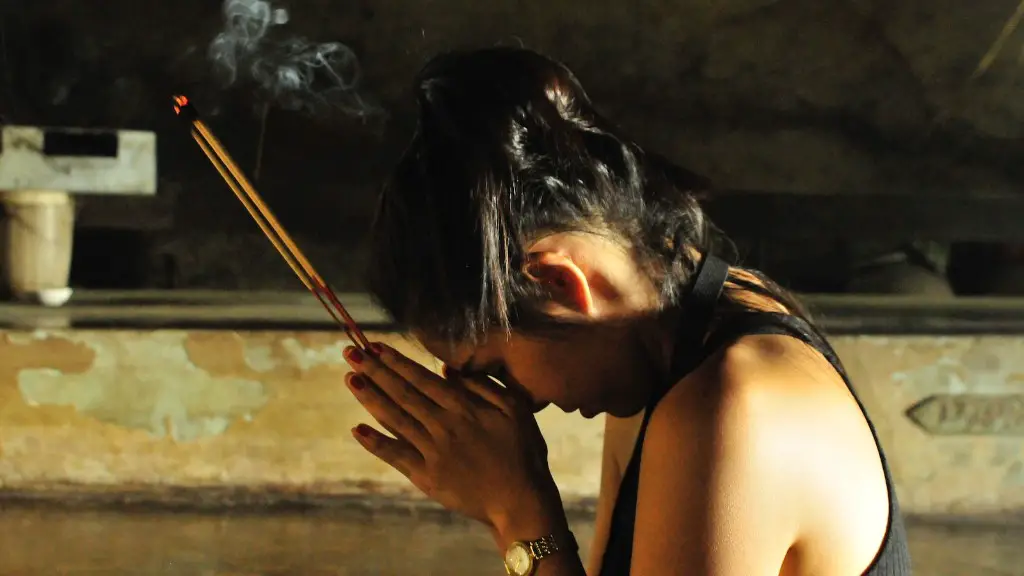Dukkha is a central concept in Buddhism, loosely translated as “suffering,” “unhappiness,” or “stress.” It refers to the inherently unsatisfactory and impermanent nature of all conditioned things. Dukkha is often described as the First Noble Truth, in that it is the recognition of dukkha as a fundamental characteristic of human existence that leads to the path of salvation.
Dukkha is the buddhist teaching on the truth of suffering. It is the first of the four noble truths and states that all of life is suffering. This suffering is caused by our attachment to things that are impermanent. The only way to end this suffering is to let go of our attachment.
What is dukkha concept in Buddhism?
Dukkha is a central concept in Buddhist thought and is often translated as “suffering”. It refers to the unsatisfactory and painful nature of life. The cause of dukkha is typically identified as craving or attachment. This can be attachment to things, people, or experiences. The Buddha taught that the only way to end dukkha is to let go of attachment and craving.
The First Noble Truth is that suffering, or dukkha, is a part of life. This includes the physical and emotional discomfort and pain all humans experience in their lives. The Second Noble Truth is that this suffering is caused by our attachment to things that are impermanent. The Third Noble Truth is that we can end our suffering by letting go of our attachment to things that are impermanent.
Why is dukkha important in Buddhism
Dukkha is a very important idea in Buddhism. It is important for Buddhists to understand and accept that suffering exists. Buddhists must also strive to end suffering by understanding why people suffer. Suffering comes from craving things and also from events in a person’s life, such as birth, old age and death.
The mental reaction to an unpleasant stimulus can vary greatly, from simply wanting it to stop, to feeling angry and frustrated. This is due to the sankhara dukkha, or the mental formations that arise in response to such a stimulus. These formations can cause a great deal of suffering, and can even lead to violence.
How do you escape dukkha?
Dukkha, or suffering, is caused by craving. In order to escape dukkha, we must let go of craving. The Noble Eightfold Path provides a means to let go of craving, and thus escape suffering.
It is true that the only way to keep dukkha dukkha from arising is to change our response to unpleasant experience. If we can acknowledge unpleasant feelings and sensations, be with them and let them run their course, dukkha dukkha will not arise. However, this is easier said than done. It takes a lot of effort and practice to be able to do this.
What is the opposite of dukkha?
It is important to remember that even the wise suffer, for suffering is everywhere. This is a difficult concept for many of us to accept, because we often think that if we are wise or have chosen the right path in life, we should be exempt from suffering. However, the truth is that suffering is a part of life and we all experience it at some point. What matters is how we deal with it and how we learn from it. If we can do this, then we can find comfort and joy even in the midst of suffering.
Buddha is said to have identified eight causes of dukkha:
1. Birth
2. Death
3. Decay
4. Disease
5. Association with the unpleasant
6. Separation form the beloved
7. When one does not obtain what one desires
8. The Five Aggregates matter, sensations, perceptions, mental formations, and consciousness.
It is important to note that these causes are not all necessarily negative. For example, birth can be seen as a cause of dukkha because it leads to death. However, birth can also be seen as a cause of joy because it brings new life into the world.
Buddhism teaches that the only way to truly end dukkha is to attain Nirvana, which is a state of complete freedom from suffering.
Which is the cause of suffering dukkha
Buddhism teaches that desire and ignorance are the root cause of suffering. By desire, Buddhists refer to craving pleasure, material goods, and immortality. These are things that we want that can never be satisfied. As a result, desiring them can only bring suffering.
Suffering is an inherent part of life in the realm of rebirth. It is the result of our karma, or the consequences of our actions. Because we are constantly reincarnating, we are subjected to the endless cycle of birth, death, and rebirth. This cycle is full of suffering, as we are never able to escape the cycle of pain and suffering.
What are the 7 states of dukkha?
Dukkha is a Sanskrit word that is often translated as “suffering,” “stress,” or “unsatisfactoriness.” birth, aging, illness, and death are all examples of dukkha. Sorrow, lamentation, pain, grief, and despair are also forms of dukkha. And, finally, not getting what we want is also a form of dukkha.
Dukkha is the Pali word for “suffering.” It is often translated as “stress,” “unsatisfactoriness,” or “dissatisfaction.”
Dukkha is commonly explained according to three different categories:
1) The obvious physical and mental suffering associated with birth, growing old, illness and dying
2) The anxiety or stress of trying to hold onto things that are constantly changing
3) The feeling that something is missing or lacking in our lives.
Dukkha is an important concept in Buddhist teaching because it is seen as the root cause of all our suffering. The Buddha taught that we can free ourselves from dukkha by following the Eightfold Path.
What is the experience of dukkha
Dukkha is a difficult concept to translate, but it essentially means “suffering” or “unhappiness.” It can be gross, such as our struggles with mental torment, severe illness, and death, or it can be subtle, such as not getting what we want exactly how and when we want it. The Buddha taught four noble truths in order to help us understand and deal with dukkha. The first truth is that dukkha exists; the second truth is that it has a cause; the third truth is that it can be ended; and the fourth truth is that there is a path to its end. By understanding these truths, we can begin to work towards liberation from dukkha.
Dukkha is a Pali word which appears in Sanskrit as duḥkha. It is most often translated as “pain”, “suffering”, “stress” or “dis-ease”. The concept of dukkha is one of the fundamental teachings of Buddhism.
Buddhism teaches that dukkha is inherent in all forms of existence, due to the impermanent and changing nature of all things. Dukkha can be experienced on physical, mental or emotional levels, and is the cause of much suffering in the world.
Buddhism teaches that the only way to overcome dukkha is to practice the Noble Eightfold Path. This path includes the practices of wisdom, ethics, and meditation, which lead to a deeper understanding of the nature of reality and the ultimate goal of liberation from suffering.
How do Buddhists get forgiven?
We all make mistakes and it can be very hard to forgive ourselves for them. However, in Buddhism, it is important to forgive ourselves in order to move on and be at peace. One way to do this is to practice repeating phrases of forgiveness toward ourselves. This can help us to let go of the past and start fresh.
It is natural to feel attached to the people and things in our lives. But sometimes, for our own wellbeing, it is necessary to let go. Here are some tips for doing just that:
Create a positive mantra to counter the painful thoughts.
Do your own work.
Practice mindfulness.
Be gentle with yourself.
Allow the negative emotions to flow.
Engage in self-care.
Is dukkha an impermanence
Dukkha is the suffering that is caused by change and impermanence. Everything in the world is impermanent, so everything is susceptible to dukkha. This doesn’t mean that we should try to avoid change or impermanence, because that is impossible. What we can do is try to develop a clearer understanding of dukkha and how it works. This will help us to suffer less when things change and to find joy in the moments that are fleeting.
Dukkha is a central concept in Buddhist teachings. The Buddha taught that everything in life is dukkha. Dukkha literally means pain, misery or suffering. However, the experience of the truth of dukkha is much deeper than a feeling of sorrow or contemplation about suffering. The Buddha’s teaching on dukkha shows that our attachment to things only leads to more suffering. Instead, we should focus on our own spiritual journey and let go of attachment to things in the world.
Final Words
Dukkha is a central concept in Buddhism, and is often translated as “suffering”, “anxiety”, “stress”, or “dissatisfaction”. It refers to the fundamental unsatisfactoriness and suffering that is inherent in all forms of life, and is one of the Three marks of existence.
Dukkha Buddhism is the belief that suffering is a natural part of life and that it can be eliminated by following the Buddha’s Eightfold Path. This belief is based on the Buddha’s teaching that personal suffering is caused by ignorance, desire, and hatred.


